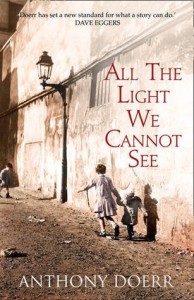I hadn’t heard anything about this novel prior to reading it. It was lent to me by my Mother-In-Law (she felt it was a bit predictable). It has since won the Pulitzer Prize for Fiction.
Here is the blurb …
The epic new novel, set during WW2, from Sunday Times Short Story Prize-winner Anthony Doerr.
Marie-Laure has been blind since the age of six. Her father builds a perfect miniature of their Paris neighbourhood so she can memorize it by touch and navigate her way home. But when the Nazis invade, father and daughter flee with a dangerous secret.
Werner is a German orphan, destined to labour in the same mine that claimed his father’s life, until he discovers a knack for engineering. His talent wins him a place at a brutal military academy, but his way out of obscurity is built on suffering.
At the same time, far away in a walled city by the sea, an old man discovers new worlds without ever setting foot outside his home. But all around him, impending danger closes in.
Doerr’s combination of soaring imagination and meticulous observation is electric. As Europe is engulfed by war and lives collide unpredictably, ‘All The Light We Cannot See’ is a captivating and devastating elegy for innocence.
I enjoyed it – although personally I would have preferred it to be even more predictable (happy ending anyone?). I love reading about quirky, out of the ordinary characters – Marie-Laure (who is blind), Werner (extremely bright and good with radios), Von Rumel (obsessively searching). There is a host of brilliantly portrayed characters.
The story unfolds from different characters view points – mostly Marie-Laure and Werner. It also shifts in time, so we know both Marie-Laure and Werner end in St Malo, but how they get there and what happens afterwards is intriguing and compelling.
While we feel sympathy for individual Germans – Werner, Jutta (Werner’s sister), Frau Elena, Volkheimer and Frederick – overall the Germans are seen as hard, merciless (even to themselves) and obsessed by race.
This novel is long – coming in at 500 pages – and I did struggle a bit at times (even though I have had all of the practice reading long Victorian novels). I think it could have been edited without losing any of its brilliance.
The settings are fabulous. I have a real feel for the various places mentioned – it made me keen to return to the Jardin des Plantes.
I do recommend this novel, but it is not for the faint-hearted. It’s about war and terrible things happen during war.
More reviews …
http://www.theguardian.com/books/2014/may/17/all-the-light-we-cannot-see-anthony-doerr-review

